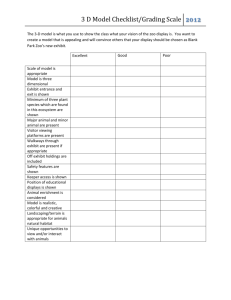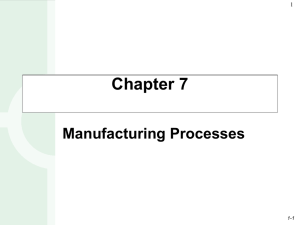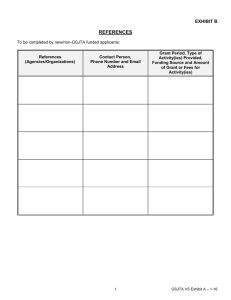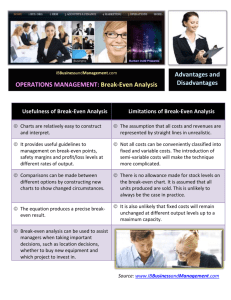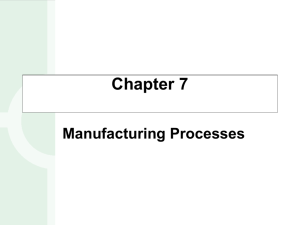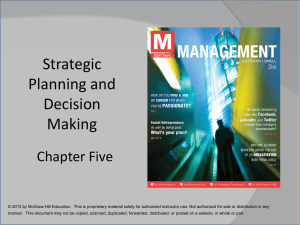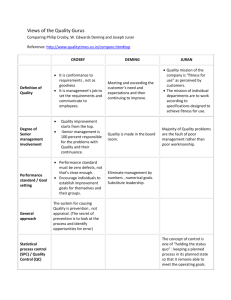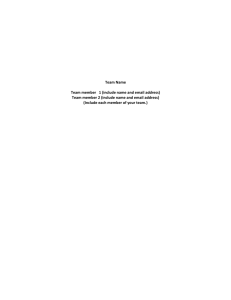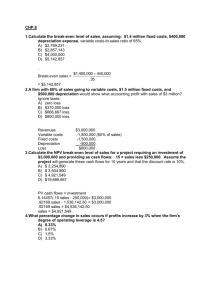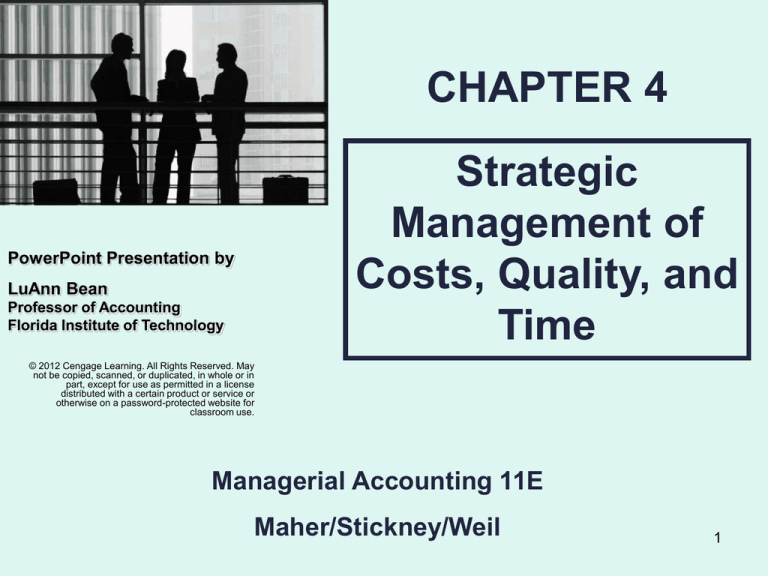
CHAPTER 4
Strategic
Management of
Costs, Quality, and
Time
PowerPoint Presentation by
LuAnn Bean
Professor of Accounting
Florida Institute of Technology
© 2012 Cengage Learning. All Rights Reserved. May
not be copied, scanned, or duplicated, in whole or in
part, except for use as permitted in a license
distributed with a certain product or service or
otherwise on a password-protected website for
classroom use.
Managerial Accounting 11E
Maher/Stickney/Weil
1
☼
CHAPTER GOAL
☼
This chapter illustrates the significance of
quality.
Prizes recognize improvements in quality.
Japan: Deming Prize
US: Baldrige Quality Award
International standards measure quality
ISO 9000: standards for quality management
ISO 14000: standards for communicating financial
impact of environmental issues
2
LO 1
TRADITIONAL VIEW
The traditional view of quality assumes that
improving quality always requires increasing
costs.
Firms can reduce total costs by
Producing lower-quality goods
Tolerating some level of defective goods
3
LO 1
QUALITY-BASED VIEW
The quality-based view holds that firms should
always attempt to improve quality.
Attempts to improve quality will succeed without
limit
Firms
Should not wait for inspections of finished products to
reveal defects
Must establish quality goals and procedures
Aim for zero defects
High quality pays for itself
4
LO 1
Traditional View
Quality-based View
Quality increases costs
Quality decreases costs
Goods require inspection
Defect-free goods require no
inspection
Workers cause most defects
System causes most defects
Require standards, quotas, goals
Eliminate standards, quotas, goals
Buy from lowest cost supplier
Buy on basis of lowest total cost
Focus on short-run profits
Focus on long-run profits
EXHIBIT 4.1
TRADITIONAL VS. QUALITYBASED VIEW
5
LO 2
QUALITY: Customer View
Three success factors to meet customer
requirements
Service
All the products features, tangible and intangible
Quality
Firm’s ability to deliver its service commitments
Cost
Customers will buy product that provides them with
preferred mix of quality, service, price
6
LO 2
VALUE CHAIN
Prevent quality
problems here
Design
Identify quality
problems here
Production
Marketing
Distribution
Deal with unhappy
customers here
Customer Service
EXHIBIT 4.3
Research and Development
7
LO 3
COSTS OF QUALITY
Prevention
Procurement inspection
Processing control
Design
Quality training
Machine inspection
Appraisal
End-process sampling
Field testing
8
LO 3
COSTS OF FAILING TO
IMPROVE QUALITY
Internal failure costs: detection before delivery
Scrap
Rework
Reinspection/retesting
External failure costs: detection after delivery
Warranty repairs
Product liability
Marketing costs
Lost sales
9
LO 4
EXAMPLE
Steve’s Sushi makes sushi for delivery
only. Steve has concerns about quality
and so he considers various ways he can
ensure/improve quality. He throws away
any prepared sushi that does not meet
strict quality standards. A quality report
follows.
Continued
10
LO 4
COST OF QUALITY REPORT:
Steve’s Sushi
Prevention Costs
Quality training
Materials inspection
Appraisal Costs
End-of-process sampling
10,000
1.00
14,400
1.44
Customer complaints
3,000
0.30
Cost of lost business
17,000
1.70
$ 60,000
6.06%
Internal Failure Costs
Scrap
External Failure Costs
Total costs of quality
EXHIBIT 4.4
Cost Categories
What
actions can
Costs of Quality % of Sales
Steve
forego if he
can’t do
$ 5,800
everything?
10,400
$ 16,200
1.62%
11
LO 4
Generally there is
a long-run decline
in total costs of
quality
EXHIBIT 4.5
12
LO 5
TOOLS
Tools to identify quality problems include
Control charts
Cause-and-effect analysis
Pareto charts
Produce signals about quality control
13
LO 5
SIGNAL: Definition
Is information provided to a decision
maker.
Warning signal indicates something is
wrong
Diagnostic signal suggests cause of
problem and possible solutions
14
LO 5
Control charts
distinguish
between random
variations and
variations to
investigate.
EXHIBIT 4.6
15
LO 5
CAUSE and EFFECT: Definition
Is analysis that first defines the
effect and then identifies the
cause.
16
LO 5
Pareto charts
illustrate
graphically the
problems or
defects.
EXHIBIT 4.7
17
LO 6
JUST-IN-TIME: Definition
Is a philosophy that seeks to
purchase/produce goods and/or
services just when the company
needs them.
18
LO 6
JIT
Factors for success in JIT
Total quality
Smooth production flow
Purchasing quality materials
Well-trained, flexible workforce
Short customer-response times
Backlog of orders
19
LO 7
IMPORTANCE OF TIME
Success in competitive markets demands
shorter new-product development time and
more rapid response to customers.
Customer response time is: (1) newproduct development time and (2)
operational measures of time.
20
LO 7
NEW-PRODUCT DEVELOPMENT
TIME: Definition
Refers to the period between a
firm’s first consideration of a
product and its delivery to the
customer.
21
LO 7
BREAK-EVEN TIME EQUATION
Break-even time =
(Investment ÷ Annual Discounted Cash Flow)
+
Time period from Project approval until Sales begin
22
LO 7
LIMITATIONS: Break-even Time
Break-even time
Ignores cash flows after break-even point
Does not consider strategic, nonfinancial reasons
for new product
Varies from one business to next, depending on
product life cycles and investment requirements.
23
LO 7
OPERATIONAL MEASURES
Indicate
Speed
Reliability
Customer response time
Delivery cycle time
Time from order to delivery
On-time performance
Delivered as scheduled
24
LO 8
BALANCED SCORECARD:
Definition
Reports an integrated group of
financial and nonfinancial
performance measures based on
vision and strategy.
25
LO 8
Balanced
scorecard can
maximize profits
and improve
performance if
used effectively.
EXHIBIT 4.9
26
LO 9
TOTAL QUALITY
MANAGEMENT (TQM)
TQM requires five changes to traditional
managerial accounting systems
System includes information to help solve
problems
Line employees collect information for feedback
Information should be available quickly
Information should be more detailed
Base rewards on quality, customer satisfaction
27
End of CHAPTER 4
28

